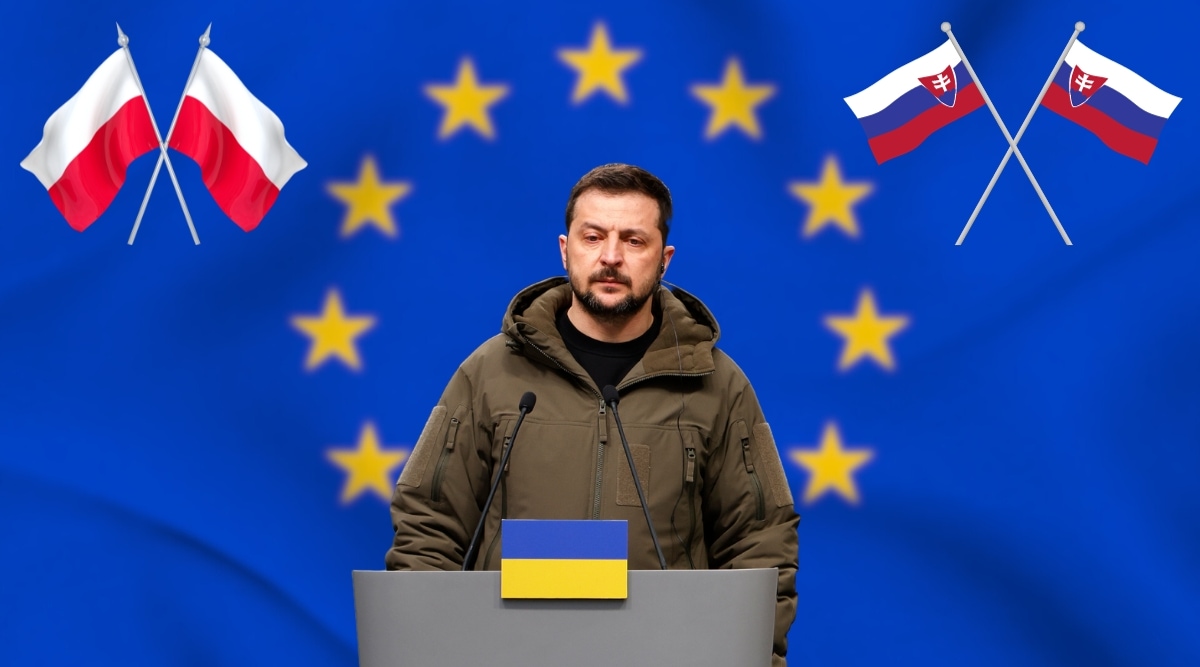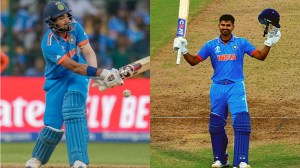Stay updated with the latest - Click here to follow us on Instagram
What Poland and Slovakia’s rift with Kyiv means for Russia-Ukraine war
As the Russia-Ukraine war inches towards its second anniversary, murmurs of waning Western support for Kyiv have gained traction with public rifts with the leaders of former allies Poland and Slovakia, and warnings of diminishing weaponry in NATO coffers.
 Murmurs of waning Western support for Kyiv have gained traction as the governments of Slovakia and Poland face the ballot.
Murmurs of waning Western support for Kyiv have gained traction as the governments of Slovakia and Poland face the ballot.
As the Russia-Ukraine war inches towards its second anniversary, murmurs of waning Western support for Kyiv have gained traction with public rifts with the leaders of former allies Poland and Slovakia, and warnings of diminishing weaponry in NATO coffers.
In Slovakia, the parliamentary elections on Saturday (September 30) saw the pro-Russian SMER party win, paving the way for it to form a coalition government. SMER party leader Robert Fico’s victory could mean trouble for Kyiv, as the former Prime Minister had run his campaign on a promise to stop supplying weapons to its eastern neighbour, saying that his country has more pressing problems to focus on.
The news from Bratislava came days after the public falling out between Poland and Ukraine, who had staunch allies since the Russian invasion of Ukraine in February 2020. In the wake of the invasion, Poland had emerged as a key supporter of Kyiv, canvassing the European Union for more financial and humanitarian support.
However, the relationship soon turned sour. In late September, the leaders of the two countries ended up in a heated back-and-forth on the sideline of the UN General Assembly meeting, with Ukrainian President Volodymyr Zelenskyy remarking with alarm “how some in Europe … are helping set the stage to a Moscow actor,” and Polish President Andrzej Duda comparing Kyiv to “a drowning person clinging to anything available.”
Projecting a united front, EU diplomats met in Kyiv on Monday to stress the union’s “clear commitment” to Ukraine, even as the UK Defence Minister warned of the declining weaponry.
The situation in Slovakia
The closely-watched Slovakian elections had seen candidates battle it out on a host of social and political issues, including immigration, the global energy crisis and the support for the LGBTQ+ community, but it is the debate on the ongoing war that has captured the attention of international media.
The key players were the Progressive Slovakia (PS) party, which had positioned itself as pro-Ukraine by pledging to continue support for Kyiv, and the Direction: Social Democracy (SMER) party, which had promised to stop the country’s aid to Ukraine. On Sunday, Slovakia’s Statistical Office announced that SMER won nearly 23% of the votes while PS won 18%.
SMER’s founder Robert Fico is a three-time former Prime Minister of Slovakia and is widely considered to be a pro-Russian politician. A lawyer with ties to the local Communist party, he had been embroiled in numerous corruption scandals and had been forced to resign from the PM post in 2018 over his alleged role in a journalist’s murder.
Fico has maintained that Slovakia has more pressing problems than Ukraine, and has refused to continue sending weapons to the war-torn nation. The 59-year-old has also refused to accept Ukraine’s move to join NATO, which Russian President Vladimir Putin had listed as a major factor in his decision to invade his neighbour.
The most public welcome for Fico has come from the Hungarian Prime Minister Viktor Orbán, who warmly welcomed the Slovakian as a “patriot”. Orban has been long criticised by the West for breaking off from the EU’s collective pro-Ukraine stance by refusing to break ties with Moscow and staunchly opposing the expansion of NATO.
Guess who's back! Congratulations to Robert Fico on his undisputable victory at the Slovak parliamentary elections. Always good to work together with a patriot. Looking forward to it! 🇭🇺🇸🇰 pic.twitter.com/JHIlYWKX6c
— Orbán Viktor (@PM_ViktorOrban) October 1, 2023
In Poland, a tale of grains and weapons
Meanwhile, in Poland, the change in sentiments towards Ukraine is more apparent and partially driven by the upcoming elections.
Poland and Ukraine have often had a strained relationship in the past. However, the Russian invasion had seen Warsaw emerge as one of Kyiv’s staunchest supporters, taking in thousands of Ukrainian refugees and acting as the logistics hub for the transfer of weaponry from the West.
More than a year later, the relationship has turned sour over a number of issues — the grain export ban, the farmer unrest over low grain prices, and Ukraine’s prioritisation of Germany over Poland for the UNSC permanent seat.
The key conflict has been over the restrictions on the import of grains from Ukraine, which Poland says has driven down the prices of its own cereals, hurting its farmers and other stakeholders. On September 18, Ukraine filed a lawsuit against Poland in the World Trade Organisation over their export ban. The EU too failed to provide respite to Warsaw by refusing to extend a temporary ban on the import of Ukrainian grains.
Things came to a head when Zelenskyy and Polish President Duda exchanged fiery words on the sideline of the UNGA summit, following which Polish Prime Minister Mateusz Morawiecki declared the decision to stop sending weapons to Ukraine.
“We are no longer transferring any weapons to Ukraine,” Morawiecki said, adding, “We are mainly focusing on modernising and rapidly arming the Polish army, so that it becomes one of the most powerful land armies in Europe.”
The current frosty relations were also driven in no small part by the upcoming parliamentary elections in Poland. The elections, to be held on October 15, could see the ruling Law and Justice party lose power. As is the trend across Europe, the incumbents are facing heavy competition from the far-right Confederation party which has been cashing in on anti-government sentiments in rural areas and are reeling under the strains of prolonged economic and military support to Ukraine.
 Thousands of people gathered for a march to support the opposition against the governing populist Law and Justice party in Warsaw, Poland, Oct. 1, 2023. (AP)
Thousands of people gathered for a march to support the opposition against the governing populist Law and Justice party in Warsaw, Poland, Oct. 1, 2023. (AP)
On October 1, thousands of anti-government protesters gathered in the centre of Warsaw as a part of ‘March of a Million Hearts’ to hear Opposition leader Donald Tusk speak. Tusk has promised to continue support for Ukraine if he wins. “The victory of Ukraine is in the national interests of Poland for sure,” Tusk said, reported The Kyiv Independent. “This will affect both economic issues and the problem of refugees. The Polish state should not budge from its position, military support of Ukraine should not be questioned.”
Part of a larger trend
The situation in Slovakia and Poland indicates a larger trend that could spread across Europe as more voters lean towards conservative and hard-right parties, as observed in Germany, Italy, Finland and Greece.
The 2024 US Presidential elections also add a layer of uncertainty to America’s continued support to Ukraine, with experts worrying that a Trump presidency could see the current financial and military backing being stripped down.
Chair of the NATO Military Committee, Admiral Rob Bauer echoed this sentiment, stating that “the bottom of the barrel is now visible” and that governments had to “ramp up production in a much higher tempo”.
It is with this in mind that the UK Defence Minister called upon all its allies to spend at least 2% of their GDP on defence. Stating that the Western military stockpiles as “looking a bit thin,” James Heappey said in the Warsaw Security Forum, “If it’s not the time — when there is a war in Europe — to spend 2% on defence, then when is?”
- 01
- 02
- 03
- 04
- 05






























